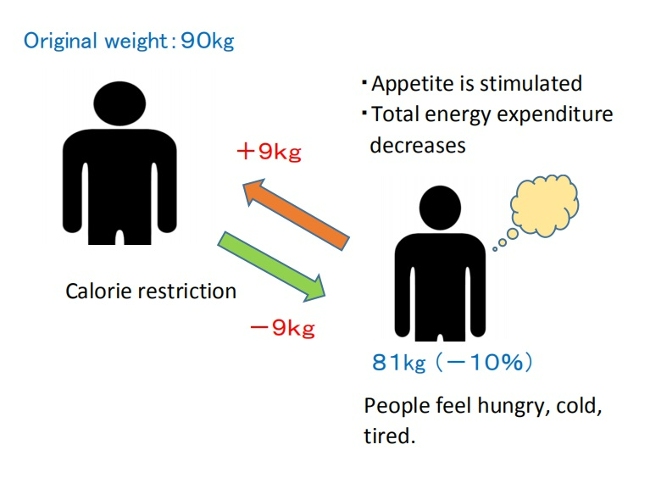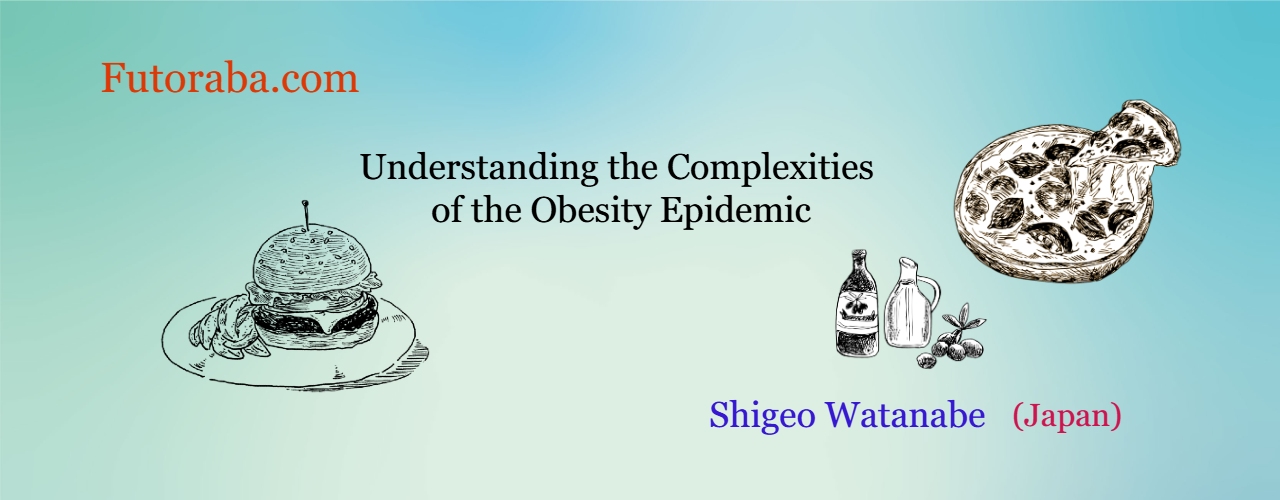Topics
11/21/2019
There Are Two Steps to Lose Weight the Right Way
-
Contents
-
- There are two ways to lose weight
- How to lower one's set-point weight
- What is your specific diet?
- Differences from low-carb diets
- The meaning of the “two-step"
- Health benefits
<The bottom line>
Although this is not a diet blog, since I’m writing the reasons why people gain weight, naturally, I thought about ways to lose weight, and I felt that I should write about it.
In this post, I will only write about my theory for losing weight. Please understand this is not based on practice, but I hope this will help someone.
1. There are two ways to lose weight
Just like the phrase “to gain weight” has two meanings, “to lose weight” also has two meanings.
【Related article】 Two Meanings to the Phrase "Gaining Weight"
(1) In the case you rebound
The first way is done by eating less and exercising more, as in conventional calorie-restricted diets. This method requires constant hunger.
The human body is thought to have a homeostatic function, and I use the "set-point" theory of body weight to explain its stable weight.
When food intake is significantly reduced and body weight decreases, the body perceives this as an energy crisis. In response, the body's protective metabolic mechanisms kick in to preserve energy stores, causing energy expenditure to drop significantly, more than expected[1,2]. Additionally, in my view, prolonged hunger increases the body's absorption rate as it tries to maximize nutrient intake.
Furthermore, the secretion of hormones that stimulate appetite increases, while the secretion of satiety hormones is suppressed[3]. You start feeling an overwhelming urge to eat.
In most cases, weight loss doesn't last long, and eventually, you rebound back to your original weight range.
In other words, attempts to sustain weight loss invoke adaptive responses involving the coordinate actions of metabolic, neuroendocrine, autonomic, and behavioral changes that ‘oppose’ the maintenance of a reduced body weight[4].
[Related article]
Dieting Doesn’t Work in the Long Run

(2) Lower the “set-point weight” itself
I believe that the problem of obesity lies in the body’s “set point” being higher than normal.
As I mentioned in (1), the fact that obese individuals show metabolic resistance to calorie-restricted diets suggests that, for some people, obesity is a natural physiological state[5]. Animal studies also support the view that obesity is a state of energy regulation at a higher set-point[5].
Therefore, in order to lose weight properly, it is necessary to lower the set-point itself that serves as the foundation for maintaining the current state. I will cite relevant literature on this topic.
"There appears to be a “set point” for body weight and fatness, and the problem in obesity is that the set point is too high.(*snip*)
There are two prominent findings from all the dietary studies done over the years.
First: all diets work. Second: all diets fail.
What do I mean?
Weight loss follows the same basic curve so familiar to dieters. Whether it is the Mediterranean, the Atkins or even the old fashioned low-fat, low-calorie, all diets in the short term seem to produce weight loss. Sure, they differ by amount lost–some a little more, some a little less. But they all seem to work.
However, by six to twelve months, weight loss plateaus, followed by a relentless regain, despite continued dietary compliance.(*snip*)
So all diets fail. The question is why.
Permanent weight loss is actually a two-step process. There is a short-term and a long-term (or time-dependent) problem. "
( Fung J. 2016. The obesity code. pages 62,215 )
2. How to lower one's set-point weight
I believe that the "long-term problem" Doctor Fung refers to is addressing the underlying cause of the elevated set-point and lowering the set-point itself without triggering the body's resistance mechanisms.
Specifically, instead of being hungry frequently, I believe that eating more fibrous foods (such as whole grains, high-fiber vegetables and nuts) and foods that take longer to digest, can help reduce hunger and gradually lower the set-point for body weight.
This is because, according to my theory, the primary cause of weight gain, which leads to an increase in the set-point, is due to the mechanism of intestinal starvation. In other words, we need to do the opposite of feeling hungry at the time.
Although I can't fully explain it at this point, I believe that when the intestines are filled with nutrient-rich, undigested food, such as fibrous vegetables, beans, and dairy products, it signals to the body that "there is still enough food."
As a result, the body doesn't perceive it as a crisis and doesn't trigger resistance mechanisms involving changes in metabolism or neuroendocrine responses.
Additionally, as hunger decreases, appetite diminishes, and absorption rates gradually decline. Eventually, I assume that body fat would decrease due to the coordinated actions between the brain—particularly the hypothalamus—and organs and peripheral tissues, etc.[6]
■It may be difficult to understand how eating food reduces absorption rate, but imagine, for example, eating a snack bread and a glass of orange juice.
If you eat it when you are starving, your blood glucose level will jump up, whereas if you eat it three hours after finishing a well-balanced lunch, your blood glucose level will not rise as much.

Even when you go out for drinks, if you haven't eaten anything for almost ten hours, you may get drunk faster, but if you eat a good lunch and have ice cream two hours before drinking, you will get drunk more slowly. In other words, if you keep eating less digestible foods and slow-digesting foods to reduce hunger, the absorption rate of food should decrease.
3.What is your specific diet?
I think the key is to reduce carbohydrate intake to a certain extent and conversely increase meat, fish, oil/fat, fibrous vegetables, seaweed, nuts, dairy products, etc. to reduce the time you feel hungry.
(If you feel a little hungry, eat something. Eat regularly even if you don't have an appetite.)
Specifically, I believe there are two ways to do this.

(1) The way to actually improve your diet
♦Reduce carbohydrate intake (rice, bread, noodles, etc.) by half to a third.
♦Eat low G.I. carbohydrates if possible, such as brown rice, whole-grain bread, cold rice (starch turns indigestible once cooled down) and al dente pasta.
♦Increase foods other than carbs such as meat, fish, fat/oil, dairy products, nuts, fibrous vegetables, seaweed, etc.
♦Avoid processed foods, fast food, and snacks as much as possible, and prioritize minimally processed foods.
♦Eat at least three meals a day, and if you feel hungry between meals, it's okay to have a snack.
♦Of course, you can combine this step with running or gym workouts, but since calorie burning is not the goal, it's better to consume something like milk before or after exercising.
<Regarding fat intake>
Fats are an important energy source for the body, and at the same time a cause of weight gain for some, but I believe that it is a food that can help us lose weight depending on how we eat it.
Fats have traditionally been considered 'fattening' because they have a high energy density of 9 kcal per gram. However, since fats take longer to digest, consuming them frequently can help sustain a feeling of satiety and, in my opinion, even contribute to weight loss. (Of course, it differs from person to person)
[Related article] Eating Fat/oil Can be a Deterrent to Gaining Weight
(2) Slow down the digestive enzymes
For those who digest food quickly and don't easily feel satiated no matter how much they eat, Method (1) may have limited effectiveness. In fact, some may even gain weight due to the extra calories consumed.
In my theory, having a 'higher set weight' is related to an increase in absorption efficiency. Additionally, as obesity levels increase, losing weight can become more difficult because they digest food quickly and their absorption rate doesn’t decrease easily. Therefore, Method (1) is not necessarily incorrect, in theory.
In a similar case, in addition to improving the diet, it may be helpful to take medication that, for example, slows down the digestive process for fats and proteins, or decreases one’s appetite.
By slowing down the working of the gastrointestinal tract or lowering the ability to digest food, undigested food will remain longer in the intestines, which will have the same effect as (1) above.
( Naturally, it must be done under a physician's guidance.)
4. Differences from low-carb diets
I can’t recommend extreme carb-cutting like the ketogenic diet, but I believe it ends up being similar to a low-carb diet in practice.
Advocates of low-carb diets claim that the real cause of weight gain is carbohydrates, which triggers insulin release, and that instead of limiting them, you can eat as many protein-and fat-rich foods as you like to make up for the calories.
In reality, however, it is not "you can eat" but rather "you have to" in order to lose weight.
If you reduce meat, fish, and fats/oils as well, you will feel hungry just like in a conventional calorie-restricted diet, and such diets do not work for long, as studies have shown.

My theory is that carbohydrates are only an indirect cause of weight gain making it easier to induce intestinal starvation. The key is that we should consume more fibrous foods and slow-digesting foods, leaving more undigested food in the intestines, to suppress hunger. So, while carbohydrates are not necessarily bad, I believe that cutting the amount of carbohydrates in the diet will be more effective.
Of course, it is possible that reducing glucose, which provides immediate energy, may speed up weight loss in the short term.
5. The meaning of the “two-step”
For those who have been dieting by eating less, their caloric intake may at least increase . So "eat more to lose weight" may sound fishy.
However, reducing caloric intake is not the final point.
・In the short term, you may not experience the dramatic weight loss that comes with calorie-restricted diets, but by slightly reducing caloric intake and eating more fibrous foods and slow-digesting foods to reduce hunger, there is a possibility of gradual weight loss.
・In the long term, by continuing this approach, I suspect that the signal that "there is enough food" may take hold, and through the interaction between the brain—especially the hypothalamus—organs, and peripheral tissues[6], the set-point weight itself may decrease, leading to a body that doesn't experience the rebound effect.
Currently, even some researchers who recognize the concept of a body’s set-point view obesity as an incurable chronic disease[7]. They state that lifestyle interventions and obesity medications do not permanently alter the body’s set point, so weight loss achieved through dieting is not sustained, and weight lost with medication tends to rebound once the treatment is stopped[7].
However, in my view, this is because calorie-restrictive diets are fundamentally flawed. By focusing so much on calorie reduction, dieting has come to be seen as a difficult process that means giving up one’s favorite foods and enduring hunger. This approach only activates the body’s resistance mechanisms.
6. Health benefits
Even if you don't lose much weight, the health benefits are immeasurable. For example, while vegetables, legumes, nuts, fermented foods, and dairy products contain some calories, I believe there's no need to worry about that.
As many nutritionists and gut health experts say, these foods are rich in vitamins and minerals, promote a healthy gut microbiome, improve gut health, boost immunity, and help prevent spikes in blood sugar. These benefits far outweigh the calorie content and likely help prevent and/or improve lifestyle diseases. Even minimally processed meats and seafood are essential, as they provide protein, fats, and minerals that are vital for the body.
The bottom line
(1)Just as the phrase "to gain weight" has two meanings, "to lose weight" also has two meanings.
To avoid rebounding, the set-point weight itself must be lowered.
(2)Lowering the set-point weight requires a two-step approach:
・In the short term, reducing refined carbohydrates and ultra-processed foods, etc., and conversely increasing less digestible foods and slow-digesting foods while adjusting caloric intake, can help reduce hunger and, in turn, may gradually lead to weight loss.
・In the long term, by continuing this approach, I believe that signals that "there is enough food" may permeate the body, which, through the interactions between the brain, digestive system, pancreas, and fat tissues, the set-point weight itself can be reduced, making the body less likely to rebound.
(3)As obesity levels increase, losing weight with diet alone may become more challenging.
I consider this is partly because they digest food quickly and don’t easily feel satiated, resulting in no reduction in absorption efficiency.
In such cases, administering medication to slow down digestive enzymes or reduce appetite might be effective for some patients with obesity.
(4)Even without significant weight loss, eating balanced meals regularly is beneficial for maintaining health and may help prevent and/or improve lifestyle-related diseases.
References:
[1]Hall KD, Guo J. Obesity Energetics: Body Weight Regulation and the Effects of Diet Composition. Gastroenterology. 2017 May;152(7):1718-1727.e3.
[2]Egan AM, Collins AL. Dynamic changes in energy expenditure in response to underfeeding: a review. Proc Nutr Soc. 2022 May;81(2):199-212. doi: 10.1017/S0029665121003669. Epub 2021 Oct 4.
[3] Jason Fung. 2016. The obesity code. Canada: Greystone Books, Page 62.
[4] Rosenbaum M, Leibel RL. Adaptive thermogenesis in humans. Int J Obes (Lond). 2010 Oct;34 Suppl 1(0 1):S47-55.
[5]Richard E. Keesey, Matt D. Hirvonen. Body Weight Set-Points: Determination and Adjustment. The Journal of Nutrition, Volume 127, Issue 9, 1997, Pages 1875S-1883S, ISSN 0022-3166.
[6]Wilson JL, Enriori PJ. A talk between fat tissue, gut, pancreas and brain to control body weight. Mol Cell Endocrinol. 2015 Dec 15;418 Pt 2:108-19.
[7]Garvey WT. Is Obesity or Adiposity-Based Chronic Disease Curable: The Set Point Theory, the Environment, and Second-Generation Medications . Endocr Pract. 2022 Feb;28(2):214-222.

